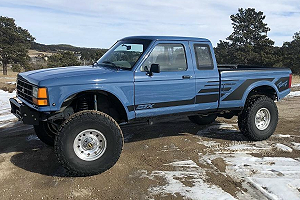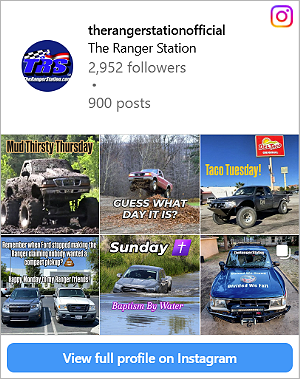Southern3.0
Well-Known Member
- Joined
- Aug 6, 2007
- Messages
- 699
- Reaction score
- 0
- Location
- New Port Nowhere FL
- Vehicle Year
- '96
- Make / Model
- Ford
- Engine Size
- 2.3, what a turd...
- Transmission
- Manual
I got this from another car forum I'm on, I figured it would help us Ranger guys out seeing how bad our headlights can get.
This guide will assist greatly in your road to re-finishing your dull, scratched, swirled, and/or oxidized lighting such as tail lights, corner lights, or headlights. Now, you can vary which products you use, but I hope you see the results I achieved with the ones present. What you will need is:
-Spray Bottle (Home Depot)
-Your Favorite Car Wash (Pep Boys or PAC)
-3 Towels (I prefer Microfiber from PAC)
-2 Applicators (I prefer Microfiber from PAC)
-A Aluminum Polish (I chose Mother’s from Wal-Mart)
AND/OR
-A Paint Polish (Like Meguiar’s #82 Swirl Free Polish from PAC)
-A Rubber Sanding Block (Ace Hardware)
-1500 Grit Wet-Sanding Papers (Ace Hardware)
-A Nylon Bristled Brush (Wal-Mart)
-A Protectant (I chose the Klasse Twins for their durability from PAC)

First off, you want to start by cleaning the lighting surface and inspecting it for damage. In the spray bottle, put 1oz of car wash and the rest water (low pressure), then tighten the bottle and shake up to mix. I used this mixture along with a microfiber towel to clean the surface. The best way to check for damage is to hold the surface into a bright light allowing the sourced lighting to reflect off what you are working with, in this case a tail light. This amplifies imperfections, and in this case, swirls were the main problem. However, there were a couple scratches in which I eventually removed.

Notice the haze over the suface...They are actually swirls
After you inspect, you could do 1 of 2 things. If your surface is pretty much flawless, I’d go straight to the polishing step, but since I had a couple scratches, the next step was to wetsand the lights down to level the surface. I took a sheet of 1500 grit wet-sanding paper and soaked it in a bucket with 1 gal water:1 oz car wash for 20 minutes. Next, I cut to fit the paper and mounted it on the sanding block. I then sprayed the taillight generously with the soap:water mixture to lubricate and began wet sanding. I went side to side which I found easiest using medium presure. DO NOT DO IT IN CIRCLES or PUSH HARD. I sanded for about 20 seconds each section (see pic) to level out the surface. I then sprayed down the light and wiped clean with my microfiber to inspect for a level surface. After inspecting, I finished up the remaining areas and went to the polishing stage.



For the polishing stage, you want to remember this. Unlike paint, you need to let the polish do all the work here, not the heat you are producing. Plastic is much weaker to heat than a clearcoat is and it will burn easily. With this said, I applied the Mother’s Aluminum Polish generously on the surface. I then took my Makita Rotary w/ polishing pad at the LOWEST speed and polished til there was only a slight haze of product, then wiped clean with a new microfiber. I inspected the surface and repeated to insure a full polishing out of all the defects. Repeat if necessary. Now, if you just have a PC, then use a polishing pad on a low setting allowing the polish to do the work, just like I stated above. By hand, you will need to start off with a paint polish like Meguiar’s #82 SFP or #83 DACP applied with a cotton or microfiber applicator in the same way you wet-sanded, side to side. You don’t want to press to hard, remember, let the polish do the work. Work it until you have a light haze of product, then remove with your microfiber. Follow this up with an aluminum polish using the same technique to bring the lights to a deep, defect free gloss. With the detailing brush, you will want to gently brush any polish from the raised lettering in “Koito” or the other words so there is no white residue.


After re-inspecting the surface under the light, you will want to protect your lighting from future dulling or oxidizing. The only way to protect them from scratching and swirling is to touch up your car-washing skills. Now for protecting, I chose the Klasse twins for their remarkable durability. I applied AIOx2 to insure all the oils from the polishes were removed, then SGx1.


Left is untouched, Right is after this full process

High Gloss and Defect Free!
This concludes the lighting restoration guide. Remember, this will work on any hard plastic lighting, but don’t attempt this on soft plastic windows. Any questions, post them back here. Good Luck!
This guide will assist greatly in your road to re-finishing your dull, scratched, swirled, and/or oxidized lighting such as tail lights, corner lights, or headlights. Now, you can vary which products you use, but I hope you see the results I achieved with the ones present. What you will need is:
-Spray Bottle (Home Depot)
-Your Favorite Car Wash (Pep Boys or PAC)
-3 Towels (I prefer Microfiber from PAC)
-2 Applicators (I prefer Microfiber from PAC)
-A Aluminum Polish (I chose Mother’s from Wal-Mart)
AND/OR
-A Paint Polish (Like Meguiar’s #82 Swirl Free Polish from PAC)
-A Rubber Sanding Block (Ace Hardware)
-1500 Grit Wet-Sanding Papers (Ace Hardware)
-A Nylon Bristled Brush (Wal-Mart)
-A Protectant (I chose the Klasse Twins for their durability from PAC)

First off, you want to start by cleaning the lighting surface and inspecting it for damage. In the spray bottle, put 1oz of car wash and the rest water (low pressure), then tighten the bottle and shake up to mix. I used this mixture along with a microfiber towel to clean the surface. The best way to check for damage is to hold the surface into a bright light allowing the sourced lighting to reflect off what you are working with, in this case a tail light. This amplifies imperfections, and in this case, swirls were the main problem. However, there were a couple scratches in which I eventually removed.

Notice the haze over the suface...They are actually swirls
After you inspect, you could do 1 of 2 things. If your surface is pretty much flawless, I’d go straight to the polishing step, but since I had a couple scratches, the next step was to wetsand the lights down to level the surface. I took a sheet of 1500 grit wet-sanding paper and soaked it in a bucket with 1 gal water:1 oz car wash for 20 minutes. Next, I cut to fit the paper and mounted it on the sanding block. I then sprayed the taillight generously with the soap:water mixture to lubricate and began wet sanding. I went side to side which I found easiest using medium presure. DO NOT DO IT IN CIRCLES or PUSH HARD. I sanded for about 20 seconds each section (see pic) to level out the surface. I then sprayed down the light and wiped clean with my microfiber to inspect for a level surface. After inspecting, I finished up the remaining areas and went to the polishing stage.



For the polishing stage, you want to remember this. Unlike paint, you need to let the polish do all the work here, not the heat you are producing. Plastic is much weaker to heat than a clearcoat is and it will burn easily. With this said, I applied the Mother’s Aluminum Polish generously on the surface. I then took my Makita Rotary w/ polishing pad at the LOWEST speed and polished til there was only a slight haze of product, then wiped clean with a new microfiber. I inspected the surface and repeated to insure a full polishing out of all the defects. Repeat if necessary. Now, if you just have a PC, then use a polishing pad on a low setting allowing the polish to do the work, just like I stated above. By hand, you will need to start off with a paint polish like Meguiar’s #82 SFP or #83 DACP applied with a cotton or microfiber applicator in the same way you wet-sanded, side to side. You don’t want to press to hard, remember, let the polish do the work. Work it until you have a light haze of product, then remove with your microfiber. Follow this up with an aluminum polish using the same technique to bring the lights to a deep, defect free gloss. With the detailing brush, you will want to gently brush any polish from the raised lettering in “Koito” or the other words so there is no white residue.


After re-inspecting the surface under the light, you will want to protect your lighting from future dulling or oxidizing. The only way to protect them from scratching and swirling is to touch up your car-washing skills. Now for protecting, I chose the Klasse twins for their remarkable durability. I applied AIOx2 to insure all the oils from the polishes were removed, then SGx1.


Left is untouched, Right is after this full process

High Gloss and Defect Free!
This concludes the lighting restoration guide. Remember, this will work on any hard plastic lighting, but don’t attempt this on soft plastic windows. Any questions, post them back here. Good Luck!













